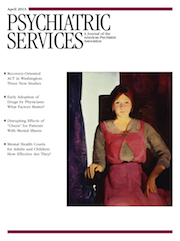Assessing the Effectiveness of Recovery-Oriented ACT in Reducing State Psychiatric Hospital Use
Abstract
Objective
The purpose of this study was to assess the effectiveness of Washington State’s PACT, a recovery-oriented assertive community treatment (ACT) initiative, in reducing state psychiatric hospital use.
Methods
A quasi-experimental design and administrative data were used to compare 450 PACT consumers and 450 propensity score–matched consumers receiving usual care. Generalized estimating equations (GEE) assessed the effects of PACT on use of state and local hospitals, emergency departments, crisis stabilization units, and arrests. The marginal effects of PACT were estimated for high users and low users of state hospitals at baseline.
Results
No difference between PACT participants and control participants was observed in the probability of having any state hospital use. A reduction in state hospital use of between 32 and 33 days per person per year was observed (p<.01). Reductions in state hospital costs were concentrated among PACT participants who had high state hospital use at baseline; cost reductions ranged from about $17,000 to $20,000 per person per year (p<.01). State hospital cost reductions were partially offset by increases in use of local services, with small but significant (p<.01) increases in local hospital use, use of emergency departments, and use of crisis stabilization services.
Conclusions
PACT had its greatest effects for consumers who were high utilizers of state psychiatric hospitals at baseline. Contrary to studies and commentaries from the United Kingdom, ACT remains a viable intervention in areas where state hospitals are overused. Whether blending traditional ACT with recovery-oriented practices also promotes consumer recovery requires further study.



